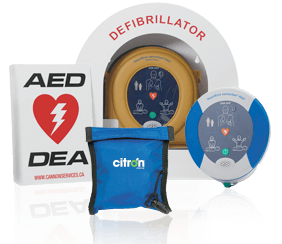Table of Contents
Updated on March 15, 2023
An automated external defibrillator (AED) is a device that can save a life before emergency responders can arrive and address a situation. There are about 40,000 cases of cardiac arrest in Canada each year, which is equivalent to one occurring every 12 minutes. In the United States, around 220,000 individuals experience cardiac arrest every year and at least 10,000 of them are at work when it strikes. Therefore, having an AED on-site can vastly improve a victim’s chance of survival.
How Does an AED Work?
When a person experiences cardiac arrest and his or her heart stops, the AED can restart it. These devices analyze the heart’s rhythm and deliver an electric shock (if necessary) to re-establish an effective heartbeat. Sudden cardiac arrest (SCA) is one of the leading causes of death in the U.S. and is the second leading cause of death in Canada, taking more lives than motor vehicle accidents, diabetes, and breast and colon cancer, combined. The odds of survival outside of a hospital setting are very low at 1-5%; however, rates can go up to 40% when there is easy access to an AED, and can go as high as 60% when it is used in the first 3-4 minutes of SCA.
Do All Businesses Need AEDs?
A workplace with 2,000 people and an average age of 40 years can expect at least one incident of cardiac arrest, according to the Heart and Stroke Foundation. Implementing an AED program is strongly recommended by OSHA and the American Heart Association. Approximately 34% of workplaces that have implemented an AED program have had to use their device at least once to save a life. In the situation of SCA, time is of the absolute essence. The chances of survival decrease by 7-10% with each minute that the victim does not receive CPR or AED treatment. As emergency responders take 8-12 minutes to arrive, having an AED can mean life or death. While CPR is an effective treatment, it has a low survival rate. Less than 20% of people who collapse and receive CPR live long enough to be discharged from the hospital.
What About Maintenance?
Citron Hygiene believes that AEDs are a critical component of an effective first aid program. These devices function at their best when they are installed, maintained, and used by trained individuals properly. We provide installation, AED/CPR training, monthly monitoring and inspections, event reviews, resets, and battery and pad replacement when required. Taking care of AEDs is just as important as providing your employees the access and training.
Related posts:
- Impact Of Inflation On Menstural Hygiene Period Poverty in 2024
- Sanitary Napkin Disposal Bins & Waste Receptacles For Workplace Bathrooms
- Workplace Safety Best Practices – Hygienic & Safe Environment
- Why Elevate Your Washroom Experience (work)
- Why Employee Retention Matters
- Dispose Of Used Tampons & Sanitary Pads – Outsourcing Needs
- ADA Compliance and Your Business
- The Benefits of Citron Complete
